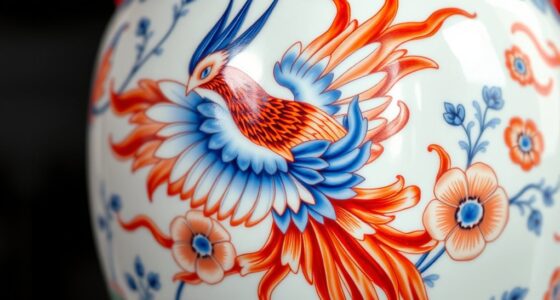Revealing the mystical phoenix bird uncovers profound meanings of renewal, transformation, and the eternal cycles of life, death, and rebirth. This legendary creature symbolizes resilience, embodying the enduring quest for change and growth. Across global mythologies, the phoenix signifies immortality, harmony, and enlightenment, urging us to embrace challenges and seek personal development. In modern times, this symbol inspires hope, resilience, and environmental consciousness. By understanding the symbolism of the phoenix, we uncover timeless themes of renewal and strength. Discover more about the mystical significance of the phoenix to deepen your insights.
Key Takeaways
- Symbolizes renewal, resurrection, and destruction in a cycle of life and rebirth.
- Represents resilience and transformation through rising from ashes.
- Linked to Egyptian, Greek, Chinese, and Middle Eastern mythologies.
- Embodies immortality, virtue, and enlightenment in various cultures.
- Inspires hope, strength, and personal growth in literature and pop culture.
Symbolism of the Phoenix Bird
In various mythologies and cultures, the Phoenix bird symbolizes renewal, resurrection, and destruction. This mythical bird embodies the cycle of life, death, and rebirth, showcasing resilience and the eternal quest for transformation. The Phoenix's symbolism goes beyond mere folklore; it explores the very essence of existence, portraying the never-ending journey of growth and evolution. Its ability to rise from its ashes represents not only a physical rebirth but also a spiritual renewal, emphasizing the enduring nature of life's challenges and triumphs.
The Phoenix's presence in mythology serves as a reminder of the interconnectedness between life and death, showcasing the beauty in endings and the promise of new beginnings. As the mythical bird builds its nest of aromatic woods and sets it ablaze, it demonstrates the power of destruction as a catalyst for rebirth. This symbolism of eternal life and transformation resonates deeply with those who seek to embrace change and navigate the complexities of existence with grace and fortitude.
Mythological Origins of the Phoenix

Emerging from the depths of ancient mythologies across diverse cultures, the Phoenix bird has captivated civilizations with its symbolism of renewal and rebirth. The legendary Phoenix has its mythological origins deeply rooted in Egyptian, Greek, Chinese, and Middle Eastern cultures. In Egyptian mythology, the Phoenix is associated with the sun god Ra through the Bennu bird. Greek mythology views the Phoenix as a symbol of immortality and renewal. Chinese mythology depicts the Phoenix as Fèng Huáng, symbolizing virtue and balance. In Middle Eastern cultures, the Phoenix represents transformation and enlightenment, akin to the Simurgh. Across these mythologies, the Phoenix is consistently associated with the sun, embodying themes of renewal and rebirth. The diverse interpretations of the Phoenix highlight its universal appeal as a symbol of transformation and enlightenment.
| Mythology | Description |
|---|---|
| Egyptian mythology | Associated with the sun god Ra through the Bennu bird |
| Greek mythology | Symbolizes immortality and renewal |
| Chinese mythology | Represents virtue, harmony, and balance |
| Middle Eastern | Symbolizes transformation and enlightenment like Simurgh |
Phoenix in Ancient Cultures

Surrounded by the echoes of ancient tales and beliefs, the Phoenix in various ancient cultures embodies symbols of rebirth, renewal, and immortality. This mythical creature holds a revered position in Egyptian, Greek, Roman, Chinese, and Middle Eastern mythologies.
Across these diverse ancient cultures, the Phoenix is a powerful symbol representing transformation and resilience. It signifies the cyclical nature of life, where death isn't the end but a step towards new beginnings. In religious beliefs, the Phoenix is often associated with eternal life, resurrection, and cosmic guardianship.
Depicted with magical abilities like healing wounds, creating fire, and even resurrecting the dead, the Phoenix symbolizes growth and renewal. Its presence in ancient cultures continues to inspire individuals to embrace change, overcome challenges, and endeavor for personal development.
The Phoenix serves as a timeless reminder of the enduring human spirit and the potential for transformation amidst adversity.
Phoenix in Literature and Pop Culture

Reflecting timeless themes of rebirth and transformation, the Phoenix mesmerizes audiences in literature and pop culture with its symbolic resonance.
In various literary works, the Phoenix symbolizes renewal, resilience, and hope, embodying the idea of overcoming challenges and starting anew.
Pop culture often depicts the Phoenix as a magnificent bird emerging from flames, representing the concept of regeneration and immortality.
From classic literature to modern movies like Harry Potter, the Phoenix serves as a powerful metaphor for transformation and the ability to rise above adversity.
Many artists and writers draw inspiration from the Phoenix's symbolism, using it to convey messages of strength and perseverance.
Its presence in literature and pop culture showcases the enduring appeal of the Phoenix myth and its message of triumph over obstacles, making it a captivating symbol of resilience and renewal that continues to resonate with audiences worldwide.
Modern Significance of the Phoenix

The Phoenix's symbolism in contemporary society continues to inspire individuals towards embracing resilience and embracing new beginnings. The modern significance of the Phoenix lies in its representation of rebirth, renewal, and resilience in the face of challenges. It serves as a powerful symbol of hope, strength, and the ability to overcome obstacles in life. The Phoenix inspires creativity, personal growth, and transformation in individuals seeking a fresh start or new beginnings. Its symbolism extends to environmental consciousness, promoting sustainability, conservation, and the protection of the planet. The Phoenix's relevance today emphasizes themes of mental health, diversity, unity, and community building for a better future.
- The Phoenix symbolizes rebirth and renewal, offering a beacon of hope in challenging times.
- Its representation of resilience and strength inspires individuals to overcome obstacles with determination.
- The Phoenix encourages personal growth and transformation, fostering a mindset of continuous improvement.
- By promoting environmental consciousness, the Phoenix advocates for sustainability and conservation efforts.
- Embracing the Phoenix's symbolism can also contribute to mental health awareness and community building for a brighter tomorrow.
Frequently Asked Questions
What Is the Hidden Meaning of the Phoenix Bird?
The hidden meaning of the Phoenix bird centers on themes of rebirth, renewal, and transformation. It symbolizes immortality, resilience, and the cyclical nature of life.
Associated with fire, ashes, and the sun in various mythologies, the Phoenix inspires hope, represents inner strength, and symbolizes overcoming challenges.
It embodies the idea of rising from the ashes stronger and more powerful than before, showcasing the beauty of renewal and growth.
Does a Phoenix Represent New Beginnings?
Yes, a Phoenix represents new beginnings. It symbolizes transformation and overcoming challenges. The Phoenix is all about rising from the ashes stronger and renewed, embodying hope, resilience, and the cyclical nature of life.
Across cultures, this mythical bird signifies rebirth and regeneration, making it a powerful symbol of starting afresh.
Is Phoenix Bird Good or Evil?
The Phoenix bird is unequivocally good. It embodies qualities of hope, renewal, and resilience, symbolizing positive transformation and overcoming challenges.
In various mythologies and cultures, the Phoenix is revered for its benevolence and majestic nature, representing immortality and regeneration.
Its actions and attributes lean towards goodness and enlightenment, making it a powerful symbol of positivity and rebirth in diverse belief systems.
What Does a Phoenix Symbolize Spiritually?
When discussing what a phoenix symbolizes spiritually, we must understand its significance in various belief systems.
The phoenix represents renewal, transformation, and the eternal cycle of life, death, and rebirth. It embodies hope, resilience, and the ability to overcome challenges.
This mystical bird also signifies immortality, enlightenment, and the eternal soul.
Conclusion
To sum up, the mystical phoenix bird holds a powerful symbolic meaning across various cultures and time periods. Its ability to rise from its ashes represents renewal, transformation, and the cyclical nature of life. Similarly, creatures in nature, such as the red dragonfly, carry significant symbolism. For example, the meaning of red dragonfly sightings is often associated with change, adaptability, and the fleeting nature of time, further highlighting nature’s deep connection to these themes.
Just like the proverb says, 'Out of the ashes, a new beginning.'
The phoenix represents resilience, transformation, and rebirth, inspiring us to rise from our challenges and adversities stronger than before.
Its presence in mythology, literature, and pop culture continues to captivate and fascinate us, reminding us of the eternal cycle of life and renewal.










